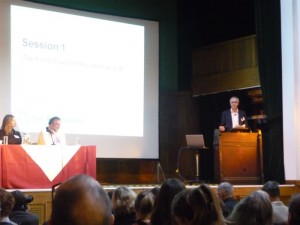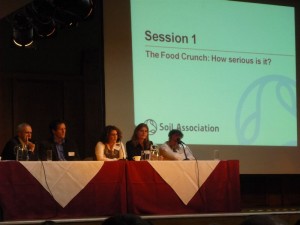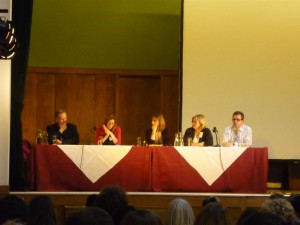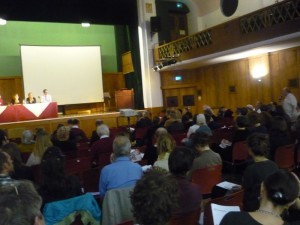13 Nov 2009
The Future of Food conference, Conway Hall, London. 12th November 2009
 Oh these mad Devon-to-London-and-back-in-a-day trips, I really must learn not to do them. I’m writing this on the train home after the train was stuck for half an hour at Pewsey due to a failed signal, which the driver waited for and then, it would appear, noted that it wasn’t working and just thought “sod it”, and carried on through it. Not sure if that’s standard procedure, anyway, at least we’re moving again. So, this is a write up of the ‘Future of Food’ event organised by the Soil Association, its International Conference, which was the cause of my early rising and late return home.
Oh these mad Devon-to-London-and-back-in-a-day trips, I really must learn not to do them. I’m writing this on the train home after the train was stuck for half an hour at Pewsey due to a failed signal, which the driver waited for and then, it would appear, noted that it wasn’t working and just thought “sod it”, and carried on through it. Not sure if that’s standard procedure, anyway, at least we’re moving again. So, this is a write up of the ‘Future of Food’ event organised by the Soil Association, its International Conference, which was the cause of my early rising and late return home.
There were lots of speakers at this conference, so I’m not going to give you a write up of every one, just a few of the highlights gleaned from my very poor notes. Any appalling misrepresentation of what people said is my own fault entirely. The first session was titled “The Food Crunch: How serious is it?” I arrived to hear Prof. Bob Watson, Chief Scientist at DEFRA, giving his talk about climate change and the challenge it presents to agriculture. In stark and powerful contrast to an appalling presentation about climate change and agriculture that I saw at the Transition Farming event in Exeter earlier in the week which basically said that a 2 degree rise in temperature would leave England like the Algarve (no mention of what sorry state the Algarve would be in) with olives and peaches, enough to make anyone rush out and buy a 4X4 to bring it on, this was the real deal. Most of the world’s ‘food bowls’ will become drier, Watson stated, there is a very significant threat to the world’s ability to produce cereals and grains, as well as impacts on fisheries and livestock.
We need, he argued, to prepare for a 4 degrees world. As part of that, we need to give serious consideration to GM technology because of the threat of climate change, that some varieties can reduce the reliance on nitrogen fertilisers and therefore lower emissions. We need to increase public and private investment, have a balanced trade system, innovation and we need to double the available food over the next 25-50 years.
Climate change presents both challenges and opportunities he said. He was asked a question about relocalisation and what role it could play, and he came up with the extraordinary statement that the world could needed globalisation, economic growth, technology and relocalisation all at the same time! It was however excellent to hear someone so high up in DEFRA acknowledging the scale of the threat to agriculture from climate change and that business as usual is no longer an option. His talk did however, reveal the pitfalls of looking at climate change without also thinking about peak oil, and the spectre of GM loomed over the stage as he spoke, in the same way that 5 years ago we were told that we needed to keep ‘an open mind’ on GM, and have a ‘public debate’, and now here we are with the announcement of 10 new nuclear plants being built.
 Then Patrick Holden, Director of the Soil Association responded, pointing out how far DEFRA have moved in recent years and how welcome Watson’s speech was. He then set out the Soil Association’s take on the future of food, arguing, as is set out in the ‘Food Futures’ strategy document the Soil Association published that day (not available online yet, I’ll post a link when it is), the key ingredients of a resilient food system. These included the need for a national food plan, for identifying a sustainable diet for the UK, and a call for a Great Reskilling. We need a framework for international trade, restricting international trade in crops that could be grown here and in unsustainably produced food. It is, he argued, a project on the scale of a war effort. He noted the huge interest in local food production and food growing at the moment, likening it to how animals know there is a tsunami coming. Something has changed, he said.
Then Patrick Holden, Director of the Soil Association responded, pointing out how far DEFRA have moved in recent years and how welcome Watson’s speech was. He then set out the Soil Association’s take on the future of food, arguing, as is set out in the ‘Food Futures’ strategy document the Soil Association published that day (not available online yet, I’ll post a link when it is), the key ingredients of a resilient food system. These included the need for a national food plan, for identifying a sustainable diet for the UK, and a call for a Great Reskilling. We need a framework for international trade, restricting international trade in crops that could be grown here and in unsustainably produced food. It is, he argued, a project on the scale of a war effort. He noted the huge interest in local food production and food growing at the moment, likening it to how animals know there is a tsunami coming. Something has changed, he said.
Deborah Doane, director of the World Development Movement then discussed the role of speculators in driving food prices up, the dangers of food being a commodity and the influence of corporations on the food system. The world supply of key foods is now in the hand of a very small number of corporations, for example in the UK, 75% of food is sold through just 5 supermarkets. It is important that we understand that trade liberalisation does not lead to food security. Corporations have gained huge influence over policy makers through the role of lobbyists.
 Julia Wright of Garden Organic and author of Sustainable Agriculture and Food Security in an Era of Oil Scarcity: Lessons from Cuba, spoke about the research she had done in Cuba about the experience of the Special Period and the time shortly thereafter. So, for those of you who don’t know the story, in 1989, the Soviet Union collapsed, it lost 50% of its diesel and food imports, 75% of its petrol and agrichemicals, leading to a 30% fall in domestic food production and a 50% fall in sugar production. On top of this, they had to cope with US sanctions.
Julia Wright of Garden Organic and author of Sustainable Agriculture and Food Security in an Era of Oil Scarcity: Lessons from Cuba, spoke about the research she had done in Cuba about the experience of the Special Period and the time shortly thereafter. So, for those of you who don’t know the story, in 1989, the Soviet Union collapsed, it lost 50% of its diesel and food imports, 75% of its petrol and agrichemicals, leading to a 30% fall in domestic food production and a 50% fall in sugar production. On top of this, they had to cope with US sanctions.
Between 1959 and 1989, Cuba had developed an intensive industrial agricultural system, very oil dependent. Then, so the myth goes, Cuba went organic and fed everyone. Not that simple though, she told the audience. The reality was that people only got one meal a day, essential commodities such as soap were unavailable, transport fell by 80%, and people started growing food in urban areas. After initial scepticism, the Government began to support it. It focused on horticulture, salads, herbs, tomatoes etc, but only managed to produce 5% of the total national consumption. Yields could have been higher if tropical varieties were grown, but people tend to grow temperate vegetables.
Some of the things Government did included a national nutrition surveillance plan, where an eye was kept to see if everyone was getting sufficient nutrients. It strove to secure equitable access to available foods, to promote self sufficiency among the people, and to import food shortfalls. Many people had allotments at their work. Farm sizes shrank. The lessons from the whole experience were that national food security is achievable with political will and cohesive action, petroleum scarcity forces relocalisation, petroleum scarcity alone does not lead to a more resilient agriculture, knowledge and intent are also required, and that a low impact agriculture does not alter the environmental and health problems of industrialised food systems.
 After the break, the second session was entitled “Who’s responsible for change? What is the role of government, civil society, industry, and individuals?” Rosie Boycott talked about the amazing work she and London Mayor’s office are doing in the Capital Growth project, trying to get 2012 new food gardens in place in the city in time for the Olympics. Food being grown in new raised beds, dumpy bags, skips, on rooftops. Great stuff. Then Sue Dibb from the Sustainable Development Commission talked about what they are doing, and then Paul Kelly, Head of Corporate Affairs at ASDA talked about all the things ASDA is doing to reduce its carbon footprint. He said that ASDA provided a vital social function in providing cheap food, and that it was committed to making it as sustainable as possible. He said that he thought relocalisation was a good idea, and that he could see a strong role for the supermarkets in it. He was quizzed by Rosie Boycott as to how ASDA could talk about healthy eating while selling cheap chickens, he replied that they tried to get people to buy free range ones, but that they had to supply demand.
After the break, the second session was entitled “Who’s responsible for change? What is the role of government, civil society, industry, and individuals?” Rosie Boycott talked about the amazing work she and London Mayor’s office are doing in the Capital Growth project, trying to get 2012 new food gardens in place in the city in time for the Olympics. Food being grown in new raised beds, dumpy bags, skips, on rooftops. Great stuff. Then Sue Dibb from the Sustainable Development Commission talked about what they are doing, and then Paul Kelly, Head of Corporate Affairs at ASDA talked about all the things ASDA is doing to reduce its carbon footprint. He said that ASDA provided a vital social function in providing cheap food, and that it was committed to making it as sustainable as possible. He said that he thought relocalisation was a good idea, and that he could see a strong role for the supermarkets in it. He was quizzed by Rosie Boycott as to how ASDA could talk about healthy eating while selling cheap chickens, he replied that they tried to get people to buy free range ones, but that they had to supply demand.
Peter Melchett of the Soil Association talked about the role of organic farming in meeting the low carbon agenda. He acknowledged that Bob Watson’s talk was the first time he had heard Government saying that business as usual won’t work. We need to start by asking ‘what is local food?’ and everything will then follow from that. He criticised DECC’s Low Carbon Transition Plan’s target of 6% cuts in emissions from farming as appallingly lax and that it should be more like 20%. Ultimately, he concluded, we vote as to what food system we want three times a day at mealtimes. Then another tea break….
 In the last session, “What are the alternatives and how do we support innovation in the food system?”, I was the opening speaker. I talked about Transition, starting with telling stories about some of the recent exciting developments, the Brixton Pound, the Taunton Resilient vision document and some other things. I talked about the local food plans being drawn up in different places, and the Can Britain Feed Itself project Transition Network is starting to plan for. I said that when peak oil is woven into Bob Watson’s mix, things look very different. I talked about relocalisation, about resilience, and concluded by talking about a conversation I had had over lunch with someone about when did I think the government would embark on a programme of resilience building and relocalisation, would it conceivably happen before a crisis was in their faces? I thought probably not, but with the great work that Transition initiatives, the wide range of local food organisations, the Soil Association and other are doing, when they do, perhaps they will find the food networks needed already in place, the reskilling required underway, food plans complete.
In the last session, “What are the alternatives and how do we support innovation in the food system?”, I was the opening speaker. I talked about Transition, starting with telling stories about some of the recent exciting developments, the Brixton Pound, the Taunton Resilient vision document and some other things. I talked about the local food plans being drawn up in different places, and the Can Britain Feed Itself project Transition Network is starting to plan for. I said that when peak oil is woven into Bob Watson’s mix, things look very different. I talked about relocalisation, about resilience, and concluded by talking about a conversation I had had over lunch with someone about when did I think the government would embark on a programme of resilience building and relocalisation, would it conceivably happen before a crisis was in their faces? I thought probably not, but with the great work that Transition initiatives, the wide range of local food organisations, the Soil Association and other are doing, when they do, perhaps they will find the food networks needed already in place, the reskilling required underway, food plans complete.
Then Andy Goldring of the Permaculture Association talked about an ‘Agricultural Revolution’ underway, with permaculture and many related practices. It is not just about agriculture and food, it is also about how we learn. We have now learnt how to learn better than we ever could before, he told the audience. Illustrated with examples of permaculture in practice around the world, his point was that innovative thinking around the redesigning of systems is not just a concept, it is already happening.
Phillip Blond, Director of ResPublica, gave a fascinating short talk about the policy framework that might be needed in order to enable relocalisation. One of the key challenges now, with the breakdown of social capital, is community formation, he argued. Change begins by people trusting each other over small things. Relocalisation calls for the reversing of a political economy that has made centralisation pay. It is not a case of being anti-markets, rather of harnessing free markets to good ends, with mechanisms such as Personal Carbon Trading, which supports people in living lower carbon lives, and wellbeing indices. It was a fascinating talk about the potential of policy to turn things around.
The last panellist was Jeremy Leggett, who said that he was concerned that Copenhagen was going to be a washout, and that his hope was that it failed spectacularly rather than just produce something halfhearted. It was looking as though Western economies who managed to find massive pots of money to bail out the banks are unwilling to find a fraction of that to support the export of low carbon technologies to the developing world. He referred to the IEA and this week’s revelations of the fiddling of the figures, likening it to the financial crisis, what he called ‘the bonus cultists and their casinos’. Inspiring as ever, he talked about his experiences of talking to people who manage pension funds and hedge funds, many of whom are aware of the gravity of the situation.
Then, for the finale, it was Vandana Shiva, whom regular readers will know is a bit of a hero of mine. The oil-based farming model is, she said, inherently unsustainable. India is home to one quarter of the world’s farmers, yet in spite of growing food, 50% of those in hunger in India are farmers. Why? Because they cannot consume what they grow, they are saddled with huge repayments, and when they buy back the food they have to pay 4 times what they were paid for it. The great economic ‘miracle’ that India has experienced has left over a quarter of Indians hungry.
She spoke about climate change, and how there is no genetic engineering for climate change. Monstanto and others now have 530 patents for climate resistent traits in plants, which are not even actually created, a computer programme is used to test for likely genes, but this is, again, the privatisation of the genetic property of the South. A monopoly on genetic information is the end of farming. This privatisation of life is being played out in Copenhagen, where large biotech companies are arguing for carbon credits for GM technology.
There is now a war against farmers and consumers. Pseudo health and safety regulations are driving small producers off the streets, in India, street food stalls are disappearing. Leave hygeine to us, she said, we know how to do it thank you very much. We don’t need the industrial system for growing food, we can do it better. Governments, she said, are unable to lead, they are increasingly just co-opted by industry. Civil society has to lead the change. We must localise our agriculture, but globalise our politics, or else the future of food, is a future of no food at all.
And that was that. A mad dash through the London Underground, delayed tubes, missed trains, home at 11.30, missing that evening’s event with Eric Schlosser. A good day though. For me the panels of speakers model is a bit past its sell by date at this stage, all the great gathered wisdom in the room, and we just all have to sit and listen to speakers all day. However good they are, it always feels like a missed opportunity to network, share ideas, discuss and find out the amazing things people are up to. Anyway, a very powerful mix of speakers, plenty of food for thought, and good to see so many old friends under one roof.
justin
13 Nov 10:29am
better remove the info about the driver going through the signal or he might get sacked 🙂
Tweets that mention The Future of Food conference, Conway Hall, London. 12th November 2009 » Transition Culture -- Topsy.com
13 Nov 11:05am
[…] This post was mentioned on Twitter by GreenFeed, Scott Redding. Scott Redding said: Good report on Transition Culture about the Future of Food conference yesterday in London – http://bit.ly/3vNuin […]
Donna Hicks
13 Nov 12:51pm
Hi Rob. What an absolutely cracking write-up of yesterday’s conference. That must have taken the full London-Devon journey to write – and I will now share profligately (Twitter and FB, I’m sure you won’t mind!).
You have superbly captured the essence of the day which, for me, was my first SA conference and (with a similarly early start and finish from Taunton)a really valuable event to attend.
I did catch the beginning of Eric Schlosser’s talk in the evening – but by then my note-taking abilities had died. Suffice to say that I will add Food Inc to my reading list and await eagerly release of the film in February! The brief description I listened to (after a perhaps 5 min film preview) was compelling – and discussion around cloned hog labelling (or not…) in the US was quite shocking.
I’m sorry we didn’t get to meet personally – especially after you made mention of Taunton Transition (I had no idea that they were making such good progress – no mention on their site of the week long visioning workshop you mentioned).
I’m just about to join the Transition Athelny team (moving house to North Curry next Friday) – but will also take a keen interest in what Taunton is up to (they are showing Age of Stupid at the local Brewhouse theatre on 22nd November by the way).
My return train journey involved beginning to read the fantastic new Local Food – and watching “The Making of” “Age of Stupid”.
Thanks again Rob. Cheers.
Jason
13 Nov 3:20pm
Wow, Vandana Shiva sounds like she talked up a storm.
Something interesting developing here. As she says, governments can’t lead when money co-opts them. But Julia Wright says that food security is achievable only with “political will and cohesive action”… the truth, as John Michael Greer says this week, is that the economies which are responding best to current conditions are places like China and Cuba, rather than market-driven democracies like ours.
It is the debt that is preventing people from eating in India, just as it is the debt that the phantom bailout money, a fraction of which we are all about to start slaving to try and cover, is supposed to start paying off. The truth is that the debt can never be paid off since there is not the wealth in the world to cover it — yet money still buys politics.
Jennifer Lauruol
13 Nov 6:01pm
Hi Rob,
Great post.
Just a small change please–Andy Goldring is Chief Officer of the Permaculture Association, not Soil Association.
Thanks in advance for tweaking your write-up.
Mike Grenville
13 Nov 6:31pm
It was clear that Prof. Bob Watson got the seriousness of the impact we are having on Climate (I hesitate to use the word ‘Change’ as Vandana Shiva said it lulls people into thinking it won’t be so bad.) But what was staggering in its contradictions was his enthusiasm for the potential of GM crops. He brushed aside health or environmental impacts from this poorly understood, untested and unneeded interference at a fundamental level of nature’s functioning as simply the concerns of consumers who don’t trust big companies and some governments. “We must use an evidence based approach to safety” he said – without a trace of irony!
The hosts from the Soil Association were too pleased to hear the many areas of agreement in his talk to say much about his enthusiasm for GM.
Thankfully Deborah Doane from WDM was on the panel who was not so constrained but had a long list of targets to focus on and the impact of GM being only one. She underlined how much power corporates have at the international level quoting from a Ghanian Finance Minister “if you don’t know what investors plans are a food plan is just wishful thinking.”
Sadly Watson not there at the end of the day to hear Vandana Shiva give a no holds bared attack on GM.
“The mix of crisis we face is a crisis of centralisation” she said. Shiva added that “the mess we are in with food comes from a reductionist view of the world.”
fling
13 Nov 9:21pm
We need to adapt. Take a look at this article The Great Transition: http://www.scribd.com/doc/21656220/The-Great-Transition-Navigating-Social-Economic-Ecological-Change-in-Turbulent-Times
Peter Bralesford
13 Nov 10:48pm
That little bit about food networks being in place got me thinking.
Whenever I pass through a city, I find myself noticing all those little bits of land that could be used for growing food, and which, rather maddeningly, aren’t. A reflection of poor design if I ever saw one.
Another interesting tangent that my mind has been on of late is a new socio-economic model that I’ve been working on. A sort of hybrid between capitalism and communism, where businesses are owned on a communal scale, everyone is allocated their own bit of land, and other such things.(Except that the chickens STILL won’t clear up after themselves – why can’t they use the muckheap?!)
I would have called it “Communalism” but that otherwise highly appropriate name has unfortunately been associated with a load of gun-toting anarchists. Ho hum…
Peter Bralesford
13 Nov 11:07pm
Just correcting a mistake in my last comment: (1st line 5th-12th word along)
*Food networks being in place when the government decides to do something.
Rob
13 Nov 11:17pm
Oops, thanks Mike, well spotted. Duly corrected. I think, as I reflected on the day, that the best form of the conference would have been Vandana, the guy from ASDA, Bob Watson and Jeremy Leggett in a debate. I saw Vandana Shiva in Dublin in 1996 at the first Convergence, debating GM with the head of Monsanto Ireland. He arrived brimming with corporate arrogance, and she gently, firmly and ruthlessly picked him to pieces. It was marvellous. I don’t know if it was just down to peoples availability, but a good feisty debate would have been wonderful. I’d love to have seen her respond to Watson’s comments on GM and ‘feeding the world’.
Mike Grenville
14 Nov 12:34am
yes not having Watson in the room with Shiva was one of the sadly missed opportunities of the day.
The other was as you said was too many speeches from the stage and not enough opportunities for those on the floor to contribute and get their teeth into and contribute to and take the debate forward.
As one of the questioners put it, in spite of the rhetoric from the stage there was a surreal lack of a sense of urgency which was at odds with the information we were hearing – that the food crisis was soon not to be limited to the current one billion people in far away places but coming to a supermarket near you soon….
Eric Leach
14 Nov 8:08am
A very interesting write-up and a very interesting conference. Trying to relate all this stuff to ‘new’ government planning initiatives like Local Development Frameworks (LDFs) and Regional Spatial Strategies (RSSs) is really hard. When I make ‘Transition’ comments on Ealing’s draft LDF Core Strategy the planners clearly think I’m mad. Similarly at a recent The London Plan (our RSS) roadshow commenting on proposed TLP changes Mayoral types were unphased when I pointed out that Peak Oil is not mentioned anywhere. It’s nowhere to be found in the LDF either.
If Transition thinking doesn’t infiltrate local and regional spatial strategies it’s going to be an uphill struggle to feed us all.
Equally worrying for those with a logical turn of mind is that England (UK probably) doesn’t have a national spatial strategy.
Corinne
16 Nov 2:10am
Hi Rob,
Thanks for the wonderful writeup, It’s great for all of us that can’t possibly get to these events.
I was however able to hear Vandana Shiva here in Paris just the day before (Nov. 12). She was indeed a marvelous speaker, and I’ve been waiting for months and months for an opportunity to hear her. She was part of a panel at UNESCO presenting the latest manifesto of the International Commission on the Future of Food and Agriculture:
Manifesto on the Future of Knowledge Systems: Knowledge Sovereignty for a Healthy Planet
Fortunately, the panel explained a little more clearly what this manifesto is about: turning away from the exclusion of traditional knowledge and from the corporate control and commercialisation of knowledge through patents, etc. (…biopiracy), and instead promoting the diversity of knowledge and cultures, the knowledge sovereignty of communities, and sharing of knowledge.
Their website:
http://www.future-food.org/
doesn’t seem to be updated with this latest manifesto, but shows their other work.
Cheers, Corinne in Paris
hamid
16 Nov 11:37am
Hi Rob
Thanks for the concise summaries.
Brings home again the complexity and wholistic nature of what we are dealing with.
Action and Change Needed Everywhere!
I will pass this on to our foodgroup.
best wishes
Hamid (Samadi’s dad) North Howe Transition Toun
WILD 9 Congress in Mérida « livingandworkinginmexico
16 Nov 8:03pm
[…] • First from a learning point of view, the format was incredibly traditional. A series of key-note presentations for the first three days and even in the second week the workshop sessions in the afternoon seemed the modern equivalent of ‘chalk-and-talk’ – a sequence of powerpoint presentations. As Rob Hopkins commented in his recent Transition Town blog: […]